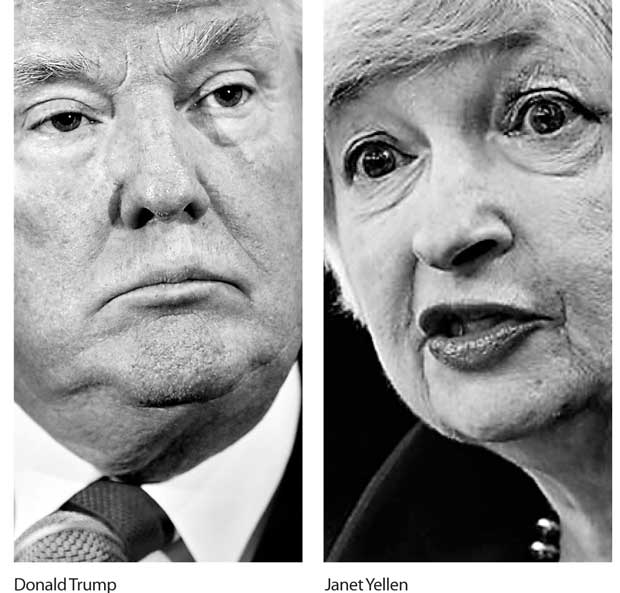16 Dec 2016 - {{hitsCtrl.values.hits}}

By James Saft
Goodbye “high-pressure” economy; an interesting idea but one Federal Reserve Chair Janet Yellen will probably never get to try in the Donald Trump era.
That’s because fiscal stimulus, particularly the kind of tax cuts Trump is contemplating, and especially protectionism, would remove what little flexibility the Fed might have to keep interest rates lower for longer. Its goal would be to help growth and employment make up ground lost during the recession and long, slow recovery.
“I never said I was in favour of a ‘high-pressure’ economy,” Yellen said on Wednesday after the Fed hiked interest rates by 25 basis points and forecast 75 basis points of tightening next year.
Indeed, Yellen never did say she was for an economy with strong demand and low unemployment, and by logical extension, one in which inflation would be allowed to run a bit above Fed targets. She did say in October, and repeated on Wednesday, that such a policy, or rather such an outcome, needs further research.
The world was a very different place in October, one in which we assumed Hillary Clinton would win the election and more or less follow economic orthodoxy.
Now Trump is calling for corporate and personal tax cuts, profit repatriation tax holidays and infrastructure spending, all accompanied by tough talk about trade.
While there is a good deal of uncertainty about what Trump will do, the risks are asymmetrically toward higher inflation.
“I believe my predecessor and I called for fiscal stimulus when the unemployment rate was substantially higher than it is now. With a 4.6 percent unemployment and a solid labour market, there may be some additional slack in labour markets but I would judge that the degree of slack has diminished,” Yellen said.
“I would say at this point that fiscal policy is not obviously needed to provide stimulus to get back to full employment.”
The Fed is going to lean against the impact of any fiscal stimulus, and do it by raising interest rates.
Remember too that Wednesday’s decision and economic forecasts were done without a clear idea of what a Trump administration will propose or carry out.
There seems to be strong support among Republicans for tax cuts and a reform of overseas corporate tax rates, potentially including a one-off chance to repatriate foreign profits at a 10 percent tax rate.
Infrastructure spending also will support the economy, but demand gains will arrive well before any productivity benefit.
Growth, inflation or stagflation
Asked if she saw Trump policies improving productivity, something that could spur growth and potentially contain inflation, Yellen more or less gave a textbook answer, rather than a statement of intent.
“Policies that would improve productivity growth would include policy changes that enhance education, training, workforce development, policies that spur either private or public investment to enhance the quality of capital in the United States, and policies that spur innovation or competition or the formation of new firms. So tax policies can have that effect,” she said.
The only easy-to-predict impact of the most likely tax cut, that on overseas profits, is to push corporate share buybacks higher, something that happened the last time this was tried in the George W. Bush administration. Stock buybacks are not, you will note, new investment, and do nothing to improve productivity, much less increase employment.
Neil Williams, economist at fund manager Hermes Investment Management in London, sees the Fed constrained in raising interest rates next year - but not because of anything that looks like a high-pressure economy.
“Loose fiscal policy will come on top of - not instead of - a loose monetary stance.
The likely short-term growth stimulus from Mr. Trump’s sizable fiscal expansion could then be muted by the threat of widespread protectionist policies - at first locally, then spreading internationally,” Williams wrote to clients.
While that at first would increase the case for tightening, as the price of goods rises due to tariffs and locally protected production, newly toughened immigration policy may exacerbate things by limiting the labour supply.
“The emergence of the ‘wrong sort’ of inflation - cost-push caused by goods and labour shortages, rather than demand-pull - would make any knee-jerk Fed tightening, if at all, short-lived as the US economy ‘stagflates,’” Williams wrote.
In light of all this, the market’s reaction on Wednesday - a mild sell-off in stocks and higher bond yields - makes sense.
The Fed, which kept the taps running during the lean times of austerity and tepid recovery, will not be playing along with the real upcoming experiment: not of a “high-pressure economy,” but of a “Trump economy”.
(REUTERS)
25 Nov 2024 2 hours ago
25 Nov 2024 3 hours ago
25 Nov 2024 3 hours ago
25 Nov 2024 5 hours ago
25 Nov 2024 5 hours ago